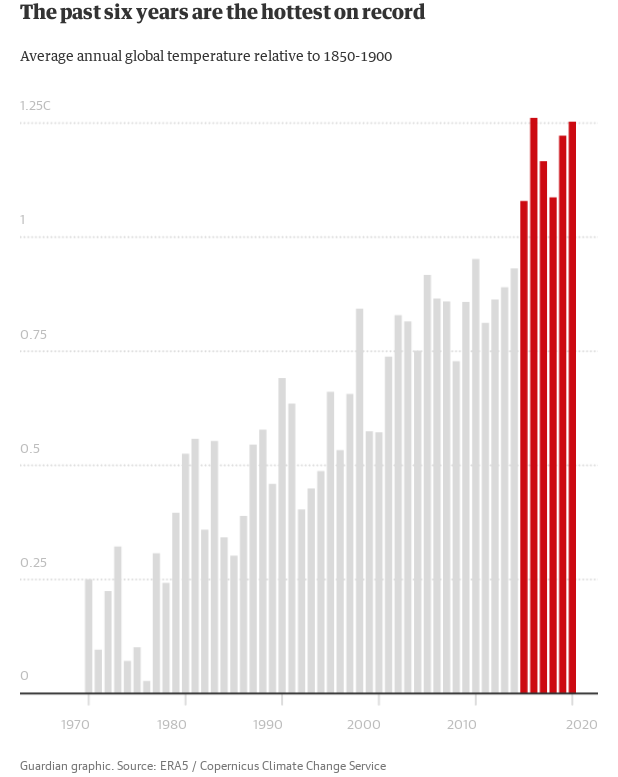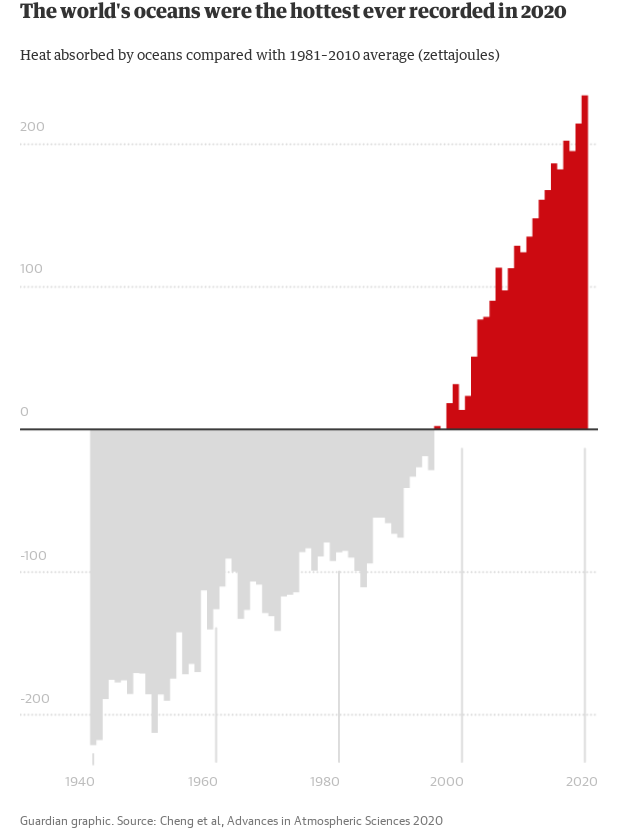But how old is the planet though?
The climate change hoaxers love to come up with these graphics to scare people.
Imagine if winter lasted centuries instead of months, and that people born and raised in it started freaking out when spring was getting near, doing all kinds of over the top things trying to stop the unstoppable, while thinking that everyone was going to be cooked to death.
That’s pretty much what’s happening here.
The fires, floods and extreme weather seen around the world in recent months are just a foretaste of what can be expected if global heating takes hold, scientists say, as the world’s leading authority on climate change prepares to warn of an imminent and dire risk to the global climate system.
The Intergovernmental Panel on Climate Change (IPCC) will on Monday publish a landmark report, the most comprehensive assessment yet, less than three months before vital UN talks that will determine the future course of life on Earth.
Policymakers have already previewed the findings, finalised on Saturday night, which have been the subject of an intense two weeks of online discussion by experts around the world, and represent eight years of work by leading scientists.
Doug Parr, policy director at Greenpeace UK, said governments must take heed of the warnings. “Practical, funded and deliverable plans [by governments] to keep us below the supposedly safe limits [of heating] are almost non-existent. Urgent climate action was needed decades ago – now we’re almost out of time. The UK government has a huge responsibility as host of the UN climate talks to ensure world leaders sign up to policies that not just put the brakes on the climate crisis, but slam it into reverse.”
The IPCC, made up of hundreds of the world’s foremost climate scientists, publishes comprehensive assessments about every seven years, with this report the sixth since 1988. This one will be different, however: previous work has shown that the 2020s are a crucial decade, in which greenhouse gas emissions must be halved in order to limit heating to 1.5C above pre-industrial levels, established by previous IPCC reports as the threshold of safety, and the lower of two goals in the 2015 Paris agreement.
Michael Mann, distinguished professor of atmospheric science at Pennsylvania State University, said this would be the last IPCC assessment that can make a real difference in policy terms, before we exceed 1.5C and the ambitions of the Paris agreement.
“Climate change is now causing amplified weather extremes of the sort we’ve been witnessing this summer – droughts, heatwaves, wildfires, floods, superstorms,” he said. “The impacts of climate change are no longer subtle. We see them playing out in real time in the form of these unprecedented extreme weather disasters.”
In recent months there have been fires in the US, heatwaves in northern latitudes, and devastating floods in China and Europe. Scientists warn that this may become the norm unless climate breakdown can be stopped.
Simon Lewis, professor of global change science at University College London, said: “The observations this summer show that some impacts [predicted in previous IPCC assessments of the climate] seem to be underestimated, but we can’t know if the devastation of summer 2021 is the new normal without a few more years’ data. But what we do know is if emissions continue to rise, then increasingly severe climate impacts will occur.”
He warned that the consequences would be severe. “What we need to keep in mind is that we all live in places that have built up over decades and centuries to cope well with a given climate. The really, really scary thing about the climate crisis is that every single achievement of every human society on Earth occurred under a climate that no longer exists,” he said. “The pressure is on for world leaders to agree both detailed and achievable plans to cut emissions now, and plans to adapt to climate impacts, when they meet in Glasgow in November.”
Your climate is gone, goy!
The oceans are evaporating.
The climate in this planet has to be exactly as it’s been for the last couple hundred years, forever.
It’s what Science says.





